仁爱八上U1T1SA新的
[全]仁爱版八年级上册英语U1T1重点单词、短语、句型(附例句)
![[全]仁爱版八年级上册英语U1T1重点单词、短语、句型(附例句)](https://img.taocdn.com/s3/m/3532d9197f1922791688e8ef.png)
仁爱版八年级上册英语U1T1重点单词、短语、句型(附例句)【重点单词】1. healthy→(同义词)fit→(名词)healthHealthy diet is good for our health.健康的饮食对我们的健康有益。
Dad keeps exercising every day to keep fit.爸爸每天坚持锻炼以保持健康。
Smoking and eating junk food are unhealthy.吸烟和吃垃圾食品是不健康的。
2. win→(过去式)won→(名词)winnerThere are two winners in the mathematics contest in our class.我们班有两名数学竞赛获胜者。
I think our class will win the game.我认为我们班会赢得这场比赛。
3. ski→(现在分词)skiingXiao Ming and his sister are skiing.小明和他妹妹在滑雪。
4. famous→(比较级)more famousXinjiang is famous for its grapes.新疆以其葡萄而闻名。
Do you know which of them is more famous?你知道他们哪个更有名吗?5. arrive→(同义词)reach/get toMy mother and I arrived in/reached /got to Beijing yesterday.我和我妈妈昨天到达北京。
6. leave→(过去式))leftIt has been three years since he left Shanghai.他离开上海已经三年了。
We will leave here for Beijing tomorrow.明天我们将离开这里去北京。
7. popular→(最高级)most popularTeresa Teng is the most popular singer.邓丽君是最受欢迎的歌手。
仁爱英语八上u1t1sa新的

Group discussion and cooperation
定义
小组讨论与合作是一种以学生为主体、 以小组为单位的教学方法,通过小组内 部的讨论、交流和合作,培养学生的团 队协作能力和沟通能力。
VS
应用
在英语教学中,教师可以利用小组讨论与 合作的方式来提高学生的口语表达能力和 写作能力。例如,教师可以安排学生分组 进行话题讨论、写作练习等活动,让学生 在小组中互相学习、互相帮助。
Work with other teachers to share best practices and improve teaching strategies.
Research
Investigate effective teaching techniques and incorporate them into their teaching practice.
Text Analysis
培养阅读理解能力
通过分析课文内容,学习者将培养阅读理解能力,包括理解文章主旨、推断作者意图、识别重要细节等。同时,学习者还将 学习如何总结文章大意和提炼关键信息。
Practice and Activities
实践与互动
课程将设计多种形式的练习和活动,如填空、选择、翻译等 ,以帮助学习者巩固所学词汇和语法知识,提高阅读理解和 写作能力。此外,教师还将组织课堂讨论、角色扮演等活动 ,鼓励学习者积极参与并提高口语表达能力。
Engagement
Create an interactive learning environment that encourages student participation.
Feedback
Provide regular feedback to students on their progress and areas for improvement.
八年级仁爱英语Unit1重点短语和重点句默写
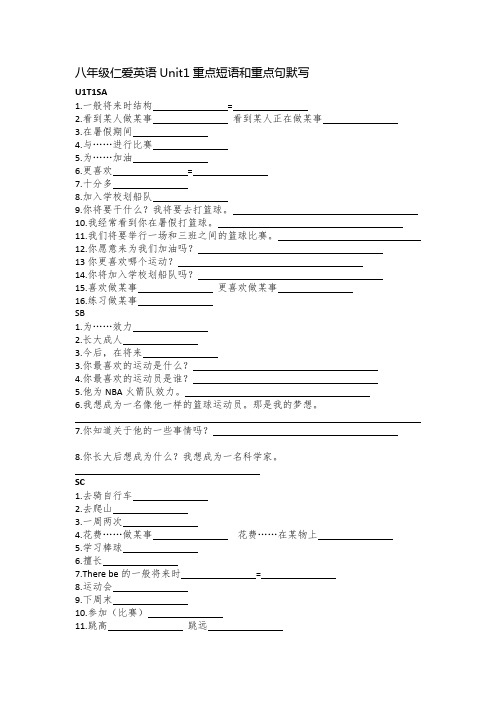
八年级仁爱英语Unit1重点短语和重点句默写U1T1SA1.一般将来时结构=2.看到某人做某事看到某人正在做某事3.在暑假期间4.与……进行比赛5.为……加油6.更喜欢=7.十分多8.加入学校划船队9.你将要干什么?我将要去打篮球。
10.我经常看到你在暑假打篮球。
11.我们将要举行一场和三班之间的篮球比赛。
12.你愿意来为我们加油吗?13你更喜欢哪个运动?14.你将加入学校划船队吗?15.喜欢做某事更喜欢做某事16.练习做某事SB1.为……效力2.长大成人3.今后,在将来3.你最喜欢的运动是什么?4.你最喜欢的运动员是谁?5.他为NBA火箭队效力。
6.我想成为一名像他一样的篮球运动员。
那是我的梦想。
7.你知道关于他的一些事情吗?8.你长大后想成为什么?我想成为一名科学家。
SC1.去骑自行车2.去爬山3.一周两次4.花费……做某事花费……在某物上5.学习棒球6.擅长7.There be的一般将来时=8.运动会9.下周末10.参加(比赛)11.跳高跳远12.使他强壮使某人/某物……13.遍及全世界14.对……有益15.后天16.一个保持健康的好方法一个做某事的好方法17.帮助他们放松18他每天花费半个小时在体育馆锻炼。
19他擅长跳跃。
20下周末将要有一场学校运动会。
21他将参加跳高和跳远。
22.因为它使他强壮,并且流行于全世界。
23它对我的腿,心脏和肺是有益的。
SD1.在过去的20年里2.到达+大地点+小地点3.中国国家队4.足球迷5.呆很长世间6.他们后天将动身去日本。
7.离开北京动身去北京8.你将加入我们吗?9.它是个遗憾。
10.be good at用法11.join 和take part in区别U1T2SA1.帮助某人=2.患病=3.……之一4.介意做某事5.别介意6.把某物踢给某人=7.把某物传给某人=8.继续努力9.尝试一下10.擅长=11.擅长做某事=12.当然= =13.立刻,马上=14.别的地方15.乱扔某物16.我的其中一个队友生病。
仁爱英语八年级上册U1T1SA
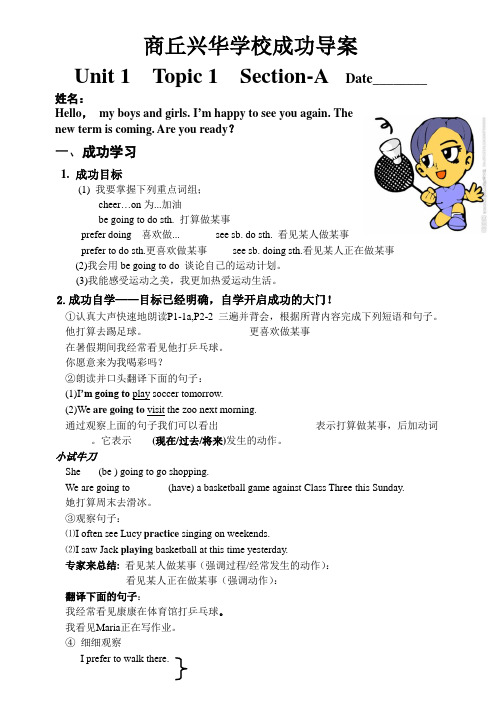
商丘兴华学校成功导案Unit 1 Topic 1 Section-A Date________姓名:Hello,my boys and girls. I’m happy to see you again. Thenew term is coming. Are you ready?一、成功学习1.成功目标(1) 我要掌握下列重点词组;cheer…on为...加油be going to do sth. 打算做某事prefer doing 喜欢做... see sb. do sth. 看见某人做某事prefer to do sth.更喜欢做某事see sb. doing sth.看见某人正在做某事(2)我会用be going to do 谈论自己的运动计划。
(3)我能感受运动之美,我更加热爱运动生活。
2.成功自学——目标已经明确,自学开启成功的大门!①认真大声快速地朗读P1-1a,P2-2 三遍并背会,根据所背内容完成下列短语和句子。
他打算去踢足球。
____________________更喜欢做某事____________在暑假期间我经常看见他打乒乓球。
____________________________你愿意来为我喝彩吗?________________________________________②朗读并口头翻译下面的句子:(1)I’m going to play soccer tomorrow.(2)We are going to visit the zoo next morning.通过观察上面的句子我们可以看出___________________表示打算做某事,后加动词_____。
它表示____(现在/过去/将来)发生的动作。
小试牛刀She___ (be ) going to go shopping.We are going to _______(have) a basketball game against Class Three this Sunday.她打算周末去滑冰。
最新仁爱英语八年级上册Unit1

最新仁爱英语八年级上册Unit1.topic3主
要知识总结
本文总结了最新仁爱英语八年级上册Unit1.topic3的主要知识点。
以下是该单元的主要内容:
1. 词汇
- 本单元的词汇包括一些常用的英语词汇和短语,如"I feel honored","have a conversation","make the most of"等。
学生们需要掌握这些词汇的意思和用法,并能够在实际情境中正确运用。
2. 语法
- 本单元的语法重点是现在进行时。
学生们需要了解现在进行时的构成和用法,即主语+be动词+动词-ing形式。
同时,他们还需要学会使用现在进行时表达正在进行的动作或状态。
3. 句型
- 本单元包含了一些常用的句型,如"What are you doing?","I'm taking a walk."等。
学生们需要熟悉这些句型,并能够准确地运用于实际交流中。
4. 对话
- 本单元的对话主要围绕日常生活中的活动展开,如购物、看
电影等。
学生们需要理解对话内容,并能够模仿对话中的表达方式
进行日常交流。
以上是最新仁爱英语八年级上册Unit1.topic3的主要知识总结。
学生们需要仔细学习并掌握这些知识点,以便更好地应对课堂教学
和日常学习。
仁爱版八上Unit1Topic 1 Section A(27张)

仁爱版八上Unit1Topic 1 Section A(27张)
Like to do sth 喜欢做某事(短暂)
Like doing sth 爱好做某事(兴趣爱好)
仁爱版八上Unit1Topic 1 Section A(27张)
仁爱版八上Unit1Topic 1 Section A(27张)
1.What are you going to do tomorrow? I am going to…
仁爱版八上Unit1Topic 1 Section A(27张)
仁爱版八上Unit1Topic 1 Section A(27张)
1c Listen again and mark T (True) or F (False).
1.Michael is going to play football. ( ) 2.Michael doesn’t like playing basketball, but he has
cycling
rowing
skating
仁爱版八上Unit1Topic 1 Section A(27张)
tennis
more sports Learn some other sports:
cycle ['saɪkl] skate [skeɪt] row [rəʊ] tennis ['tenɪs]
table tennis
“be going to +v原形”意为“打算、准备做某事 表示一般将来时,期中be动词am,is ,are要与主语的 人称和数保持一致,句末常含有表示将来的时间状语。
next Sunday
They /We are going to have a basketball game next Sunday.
仁爱版新版八年级上册英语-Unit1-topic1-Section-A课件-(1)说课材料
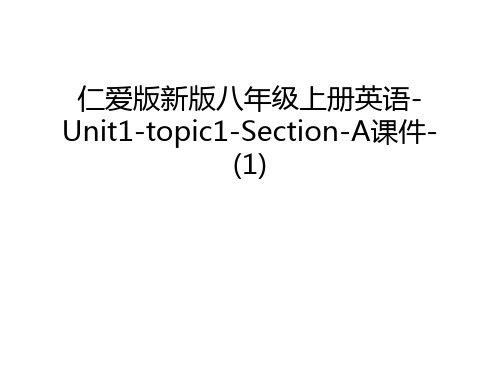
be going to do sth.表示将来计划打算做某事
肯定句:I am going to visit Beijing this Sunday.
否定句: I am not going to visit Beijing this Sunday
一般疑问 :Are you going to visit Beijing this Sunday? 特殊疑问句
—Me, too. 我也是。
also , as well
also, 也 I also like drinking milk in the morning
as well I like drinking milk in the morning as well.
• cheer v.加油,欢呼,喝彩, • cheer sb. on意为“为某人喝彩”。 • 为他加油
We are against war.我们反对战争。 between…and …在…之间
There is a basketball game between Class 3 and Class 4.
Me, too.常用于自己的做法或想法与别人的一致时。 e.g. —I like drinking milk in the morning.我喜欢早晨喝牛 奶。
Are you going to have a picnic tomorrow? Yes, we are.
Practice
用所给的词适当形式填空
1.Jacki_s g_oin_g to join (join) the football game against No.2 High School this Sunday.
2.I am going to (be) a doctor when I grow up.
仁爱英语八上U1T1SA 2017

/'saɪk(ə)l/ cycle v.骑自行车 n. 循环,周期
sports
football
tennis
volleyball
sports
table tennis
sports
cycling
rowing
skating
skiing
sports
swimming
sports
running
More sports
Ask and answer. you/ no
Are you going to cook? No, I am not.
Ask and answer.
What are you going to do tomorrow? We are going to climb hills.
Ask and answer. he, tomorrow, ?
明年这儿会有一些新房子。
There are going to be some new houses here next year.
否定: There aren’t going to be any new houses here
仁爱八年级英语课文互译
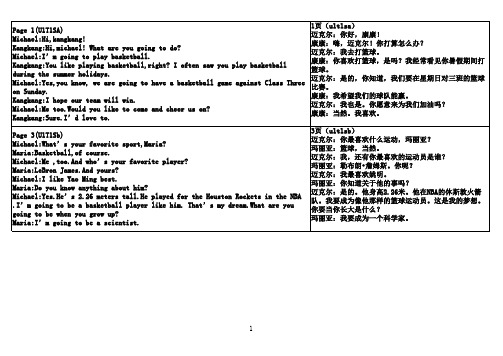
9页(u1t2sa) 康康:迈克尔,你能帮助我,好吗? 迈克尔:它是什么? 康康:我们打算在星期六与五班的足球比赛。但是我的 一个队友生病了,你要加入我们吗? 迈克尔:我会很高兴。但是我不是很擅长。 康康:你愿意教我吗?米迦勒不客气。你能办到的!让 我们去练习吧。(康康和实践在操场上通过。) 康康:迈克尔,我把球踢给你。你像这样把球传过来。 迈克尔:对不起,我错过了它。 康康:没关系。继续努力。我会把你踢了球 米迦勒好的.
3
Page 27(U6T1SA) Betty:Hello,kangkan!you don't look well. What's worong with you? Kang Kang:I have a toothache. Betty:I'm sorry to hear that.You should see adentist. Kang Kang:I think i will. Betty:I hope you'll get well soon. Kang Kang:Thank you.
更多地谈论游戏在你玩。康康,怎么说对不起,迈克
Kangkang:Michael,I’m sorry for what I said.
尔?
Michael:It’s nothing.
康康:迈克尔,我很抱歉我说了什么。
Jane:Michael,practice more and you will do better next time.
“19页(u1t3sb) 康康:你好,是在迈克尔? 米迦勒我就是。 康康:迈克尔,学校运动会是未来的明天。让我们一起 去吧。 迈克尔:我们应采取ok.what? 康康:我们会带上我们的运动服和运动鞋。 迈克尔:我要带相机吗? 康康:好主意!它将屯。 米迦勒我们什么时候见面? 康康:让它过去六年半。 米迦勒我们要在哪里集中? 康康:我的房子。 迈克尔:那你ok.see。 康康:见到你。
八上仁爱U1T1SA知识点及配套习题

八上U1T1SA知识点梳理I. be going to结构,是一般将来时的一种表达法。
1.表示主语将要进行某一行动的打算、意图。
E.g.: I’m going to play soccer.2.另外它还可以表示预测。
e.g.: Look at the sky, it is going to rain.常考点:1. be going to do sth. 表示将来计划打算做某事。
2. be going to be … 表示将来要成为什么。
1)be going to do sth.表示将来计划打算做某事肯定句:I am going to visit Beijing this Sunday.否定句:I am not going to visit Beijing this Sunday一般疑问:Are you going to visit Beijing this Sunday?肯定答语:Yes, I am. 否定答语:No, I’m not.特殊疑问句:What are you going to do?2)be going to be ...表示将来要成为什么。
肯定句:He is going to be a basketball player.否定句:He is not going to be a basketball player.一般疑问:Is he going to be a basketball player?肯定答语:Yes, he is. 否定答语:No, he isn’t.特殊疑问句:What is he going to be?II. 考点:see. 类似用法动词有:hear, watch等。
see sb do sth. 看见某人(暗含经常)做某事。
see sb doing sth. 看见某人正在做某事。
E.g.:1. I often saw Tom play basketball on the playground during the summer holiday.2. I saw Tom playing basketball on the playground yesterday this time.III. 考点against (prep,意为“对着,反对”)e.g. He walked against the wind. 他逆风行走。
仁爱八上U1T1SA导学案

(2) 我希望我们队获胜。
___________________________________(3) 周日我们将和三班打一场篮球比赛。
____________________(4) Would you like to come and cheer us on? ____________________(5) Which sport do you prefer, swimming or rowing? ______________(6) I often saw you play basketball during the summer holiday.__________________________________________________________ (7) Are you going to join the school rowing team?__________________________________________________________(三)知识链接1.【原句】I’m going to play basketball.【点拨】be going to的用法(1)be going to是一种固定结构,后面要接动词原形,用来表示按计划或安排要发生的动作,有时也可以表示推测将要或肯定会发生的动作,有“准备;打算”的意思。
含有be going to结构的句子中往往有表示将来的时间状语。
【例】①We _____ going to ________ a class meeting this afternoon.今天下午我们打算开班会。
(安排)②Look at the black clouds. It ________ going to ________.看那些乌云,快要下雨了。
(推测)(2)be going to在肯定句中的形式be going to结构中的助动词be很少用原形,它一般有三种形式,即:am , is , are。
仁爱版八年级英语上册Unit 1 Topic1 课件

Let’s listen!
Look and predict.
Listen and complete the table.
Name Favorite Favorite
sport
player
Dream job
Maria basketball LeBron James a scienll Yao Ming
New words:
teacher, player, farmer, doctor, policeman, policewoman, postman, fisherman, pilot, scientist, musician
Structures: —What are you going to be when
A: What are you going to be when you grow up?
B: I am going to be a policewoman.
A: What are you going to be when you grow up?
B: I am going to be a pilot.
pilot / paIl t/ musician /mju zI scientist / saI ntIs
grow up
Let’s practice!
A: What are you going to be when you grow up?
B: I am going to be a doctor.
Let’s learn!
player / pleI (r) LeBron James farmer / fa:m (r
doctor / dDkt (r /
fisherman / fI m
仁爱英语八上u1t3sc新的
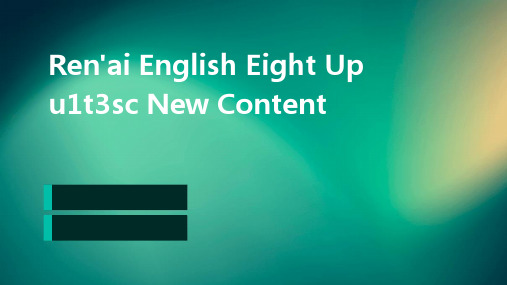
Common sentence structures
Simple sentences
Compound sentences
Shows how to combine two or more simple sentences into a compound sentence using coordinating conjunctions.
Error prone analysis
Common mistakes
05 Grammar point sorting
Key grammar rules
Subject-verb agreement
Describes the relationship between the subject and verb in a sentence, ensuring they are in agreement in number and person.
Introduces the structure of simple sentences, including the subject, predicate, and object.
Complex sentences
Explores the use of dependent clauses and subordinate conjunctions to create more complex and interesting sentences.
By the end of this course, learners will be able to
仁爱版八年级英语上册U1T1SAppt课件
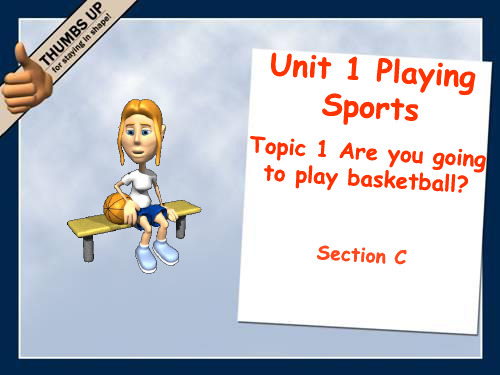
I like playing football. It makes me strong and it is popular all over the world.
Tips:1. popular意为“受大众欢迎的,流行的”。 2. all over the world 意为“全世界”。
What is he going to do this afternoon?
2. go mountain climbing去爬山 go cycling 去骑自行车
go +v ing 形式的短语表示go 的目的, 意为“去做某事” e.g. go shopping/ go skating/ go skiiing
3.spend some money/time(in/on) doing sth 花费时间、金钱做某事 e.g. He spent his whole life(in)looking after
Enjoy the video and answer the questions:
1. Do you like doing exercise? 2. How often do you do exercise? 3. How long do you spend doing
exercise?
What kind of sport is she doing? SShhSSeehhiesieSsidihsSdsoehopdinielonsagigyhnstiigtnhckhygeeiencxlblgoheian.nrisgcggehi.bsjeujau.mllm.pp. .
Read and understand (影片1)
go cycling twice a week/go mountain climbing on Sundays/do exercise in the gym every day
- 1、下载文档前请自行甄别文档内容的完整性,平台不提供额外的编辑、内容补充、找答案等附加服务。
- 2、"仅部分预览"的文档,不可在线预览部分如存在完整性等问题,可反馈申请退款(可完整预览的文档不适用该条件!)。
- 3、如文档侵犯您的权益,请联系客服反馈,我们会尽快为您处理(人工客服工作时间:9:00-18:30)。
Do you often …? Yes, I do. / No, I don’t.
swim run
volleyball
table tennis cycle row skate
ski
Do you often …? Yes, I do. / No, I don’t. Do you … much? Yes, quite a bit/a lot. /No, seldom.
Kangkang Saturday morning
完成表格并写一段话
Name Friend Friend I
Favorite sport
Going to do
Listen to the conversation and then complete the table.
Name Michael Time
Saturday morning
Saturday afternoon
Activity
do his homework play volleyball have a table tennis game
a basketball team
Basketball Game
Class 3 against Class 4 This Sunday Would you like to come and cheer us on?
Listen to the tape and answer the questions. 1) What is Michael going to do? He is going to play basketball. 2) Would Kangkang like to come and cheer them on? Yes, he’d love to. 3) Which class is Michael’s class going to play against? Class Three.
提示词 Yes, quite a bit/a lot. No, seldom. basketball football
Do you … much?
swimming running
volleyball
table tennis cycling rowing skating skiing
提示词 Yes, I am.
Make a dialog with your partner, using the following sentences.
A: Which sport do you prefer, … or …? B: I prefer … A: Do you … much? B: Yes, quite a bit/a lot. / No, seldom. A: Are you going to join the school … club? B: Yes, I am. / No, I’m not. I’m going to …
We go to school every day from September to February.
Look! He is listening to the teacher and having an English class.
Lucy read a story book with her friend. I watched TV yesterday afternoon.
小组活动
1.每组用以上三个时态造句并进句 型转换 2. 3个人说句子,3个人变一般疑问 句或者否定句
sports
basketball swimming volleyball skating cycling
table tennis running rowing football skiing
提示词 basketball football Which sport do you like better, … or …? I like … better. swimming
basketball
football swimming running volleyball
Are you going to join the school … club?
table tennis
cycling rowing skating No, I’m not. I’m going to … skiing
running
volleyball table tennis cycling rowing
skating
skiing
Which sport do you like better, … or …? I like … better. Which sport do you prefer, … or …? I prefer …
提示词 basketball football Which sport do you prefer, … or …? I prefer … swimming
running
volleyball table tennis cycling rowing
skating
skiing
提示词
basketball football
